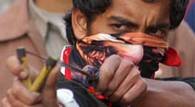blogdai thanks our regular contributor, Naagboy for alerting us to this wonderful article by Dr. Thomas Marks. I have had the distinct pleasure of corresponding with Dr. Marks on a few occasions and picking his capacious brain for ideas on Nepal. (Admittedly, blogdai spends a bit of these exchanges begging Dr. Marks to write a column for us. ) Dr. Marks is currently on his way to Columbia (University or Country, I'm not sure) to give a lecture on counter insurgency, but has mentioned that he will try to write something for us in the future. Read this article; it is dead on and mirrors many of the thoughts we've expressed here at blogdai over the past year. Dr. Marks is part of that rare breed of Western Nepal observers: he's actually BEEN to Nepal. Not only that, but he's spent time in Rolpa--in the teeth of Maoist-central--documenting the insurgency. This is no Michael Van de Veer, Marks is the real deal...(reprinted from nepalnews.com)
EXPLAINING MAOIST STRATEGY: IT'S ALL IN THE SCRIPT
By
Dr. Thomas A. Marks
Even as I write, events in Nepal unfold as if a Broadway play – nary a miscue from the script passed out months ago in the Nepalese media.
Having declared a "ceasefire inside the Kathmandu Valley," thus to gain the media "spin" that would necessarily come from "peaceful protestors" being "attacked," the Maoists proceeded elsewhere in the country to attack positions.
The Butwal attack is only the most recent example.
Open use of violence "outside" the urban centers has been accompanied by orchestrated rioting "inside." That the foreign media (with the help of the anti-government sectors in the Nepali media) persist in calling such "peaceful protest" only demonstrates how thoroughly detached they are from the reality of the people's war approach.
From the Maoist Playbook
To outline the Maoist strategy for those who were not present at the auditions for parts:
●
Overload the security forces "inside" while attacking with main forces "outside." Claim to be only supporting "peaceful" forces for change.
●
Use government troop deployments to advantage. If the security forces must move more men inside, flow into the vacuums left behind. If they move outside, send urban partisans inside.
●
Exploit every death and claim that any setback (e.g. failure to overthrow the government) proves that only the violent way is left to install "absolute democracy."
●
Break the RNA at all costs. RNA is the one real obstacle remaining in the quest for power.
So caught up is the SPA in its short-term effort to remain relevant that it is oblivious to long-term peril. SPA can be counted upon to mindlessly perform on cue.
●
Move now to exploit the opening provided by Indian perfidy. New Delhi senses an opportunity to at long last create of Nepal a dependency that will do as it is told.
From the Maoist perspective, they have adopted a "win/win" course of action: no matter what actually happens, they will benefit.
By declaring a "ceasefire outside Kathmandu Valley," they seal off the battle area, declaring that it will be a fight between rival bodies of manpower. They feel that the SPA manpower on the streets can overwhelm whatever the police and APF (the backup) can put on the playing field.
When the authorities make mistakes, which ultimately they must if SPAM plans go off as scripted, the government is again "human rights abusers" -- and the howls can already be heard from the usual suspects. Some elements of the Nepali media appear to be working deliberately to fan the anti-government flames.
Further, the violence allows the Maoists to claim they at least gave "peace" a chance.
The dream scenario, from the SPAM perspective, is to replay 1990, with masses rushing across the open boulevard leading to the main palace gate, the troops forced to open fire, bodies filmed by international media and beamed worldwide, India declaring it can no longer stand by "as democracy is crushed."
Role of IndiaIndia's role remains to be untangled, but no one who was in Sri Lanka in July 1987 – as I was – can overlook the startling similarities. The Indian invasion, conveniently disguised as the IPKF (Indian Peace Keeping Force), was but the culmination of half a decade of support for Tamil insurgents/terrorists that New Delhi thought it could "manage."
Then, as now, the shape of the international arena played a significant role. India, many have forgotten, had sided with the Evil Empire. There were some 6-7,000 Soviet advisors in the country. It was the first country outside the Warsaw Pact to receive the MIG-29 fighter, the first (and only) ever to be rented a nuclear submarine.
Beyond all else, in a relationship only now emerging from files of the KGB spirited out of the country prior to the resumption of the authoritarianism, the government of Indira Gandhi allowed itself to be fed Soviet disinformation that convinced it Sri Lanka was a threat.
Alleged "special intelligence" provided by Moscow purported to prove Colombo was on the verge of granting Washington basing and spying facilities, India became involved with the Tamil insurgents, eventually training, arming, and basing them. When an initial massing of forces to invade in early 1984 was warned off by the Reagan administration, Delhi simply waited for a more propitious moment. This came in July 1987, as the Sri Lankans moved to crush the trapped insurgents in Jaffna.
What that moment shares with the present is the astonishingly bad "intelligence" that drove Indian policymaking, as well as the claim that "foreign hands" support the monarch. Putting the word in quotation marks only highlights what Indian field commanders realized within days of landing in Jaffna – there was little they had been given in their briefing packets that was accurate.
That India's Research and Analysis Wing (RAW) had produced "analysis" every bit as flawed as any in the annals of intelligence debacles has since been recognized by no less than India's imperious Proconsul at the time, J.N. Dixit (now deceased) – though he continued to claim, even in his last writings, that India's information on America's intentions was completely reliable.
That India had completely botched its assessments of Sri Lankan ground realities would not surprise anyone who has followed what has emerged as the dominant government position in the present Nepali crisis. Indeed, Indian participants in panels held in Washington, DC, such as S.D. Muni, have distinguished themselves principally in what can only be characterized as willful ignorance of SPAM pronouncements and motives.
To cite but the most egregious example, the Indians continue to claim SPAM is willing to negotiate for itself a role in a parliamentary framework headed by a constitutional monarchy, even as the Maoists give press conferences claiming they will try the monarch in a people's court.
There do seem to be analysts who have correctly identified the astonishingly strategic myopia involved in destabilizing Nepal further even as India itself grapples with its own growing Maoist challenge. In his recent "India, Maoism and Nepal," former Finance Minister Madhukar S.J.B. Rana hit the nail squarely on the head when he wrote, "India is playing a dangerous game of pure real politic where it seeks to intervene in Nepal militarily by using the Maoist [as published] as proxy under the unbelievable propaganda 'to secure peace and democracy for the Nepalese people and to arrest the impending refugee inflow into its own territory'."
Change a word here and there, and the logic is identical to the debacle that became IPKF. It is further noteworthy that in the three bloody years that followed July 1987, IPKF acquitted itself well in "India's Vietnam" (as it was called by the press), even as Indian policymakers sought to cast blame for the blunder on anyone and everyone except themselves. (The most ludicrous position, of course, was the very one the Maoists advance now: it is all the fault of American imperialism.)
Where to From Here?
As irony would have it, it is the growing amicability of India and the US which has served as the strategic cover for New Delhi to bring Kathmandu to heel. Nepali sources have become increasingly blunt (and strident) in the same manner as the Sri Lankans all those years ago, as the Indian ties to Nepali violence become more clear.
One does not have to engage in plot mongering to posit that India is making a major policy error in steering its present course. Neither does one have to cast aspersions to point out the obvious: the SPA portion of SPAM has been willing to play the quisling for momentary political gain.
For it will be momentary, come what may. Let us suppose that the present government collapsed tomorrow. Where would that leave SPA? With two useless pieces of paper and a worthless sheath of promises.
What is tragic is that very little would seem to separate the sides at the moment save profound mistrust. The king agrees that parliamentary democracy should be restored with a constitutional monarch. The Maoists claim they will accept a democratic republic of whatever sort is decided by a constitutional convention. SPA claims the same. SPAM as a whole claims to desire a "ceremonial monarch" (but the "M" has been unwilling to desist from claiming a trial or exile is the only way out for the present monarch). RNA would become a true "national" army, which, not surprisingly, it already thinks it is.
It is important to interject RNA into the discussion, because the shape of any successor organization was a major sticking point in the previous 2003 round of ceasefire talks. SPAM seems to think this institution will simply agree to dissolve itself without discussions of what this entails.
That this will not happen was put to the Maoists directly in 2003, but they were as unwilling then to grapple with the complexities thus raised as they appear to be now. Yet the growing stratum of combat-tested, politically astute officers is not simply going to go as lambs to the slaughter.
Thus a great deal more thought is required upon the part of all sides. This will not take place as long as SPAM persists in its present course.
Dr. Thomas A. Marks is a political risk consultant based in Honolulu, Hawaii and a frequent visitor to Nepal. He has authored a number of benchmark works on Maoist insurgency.








